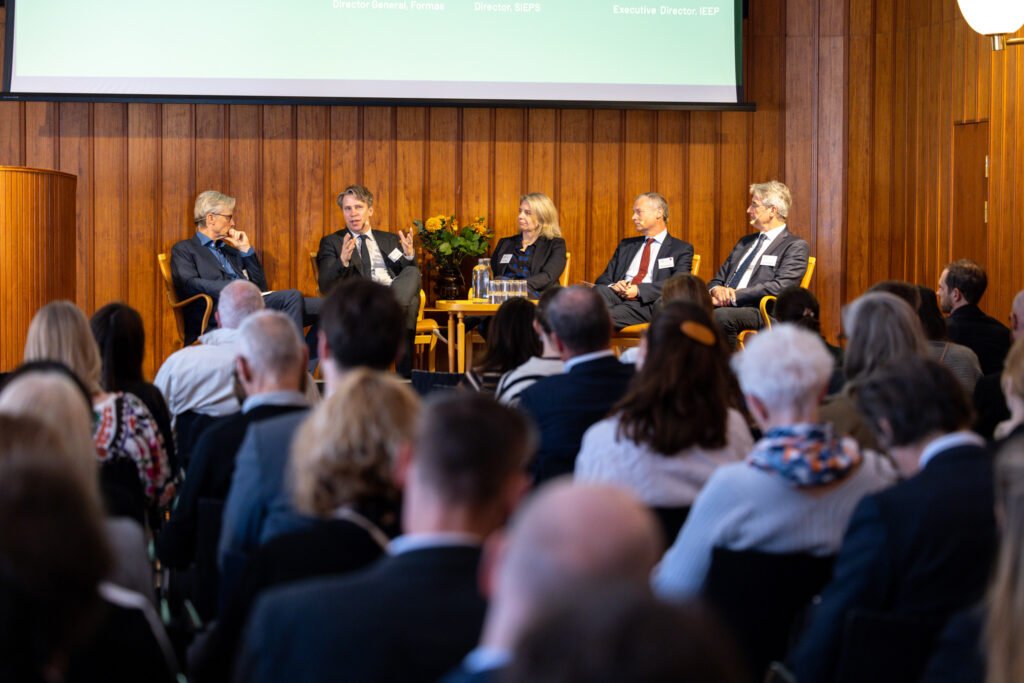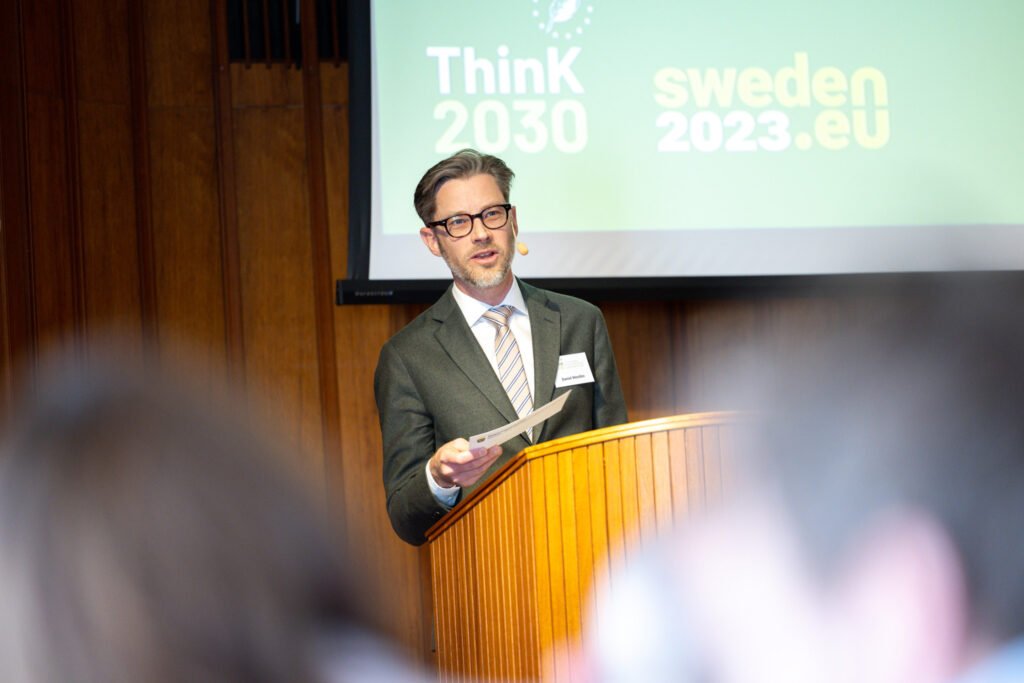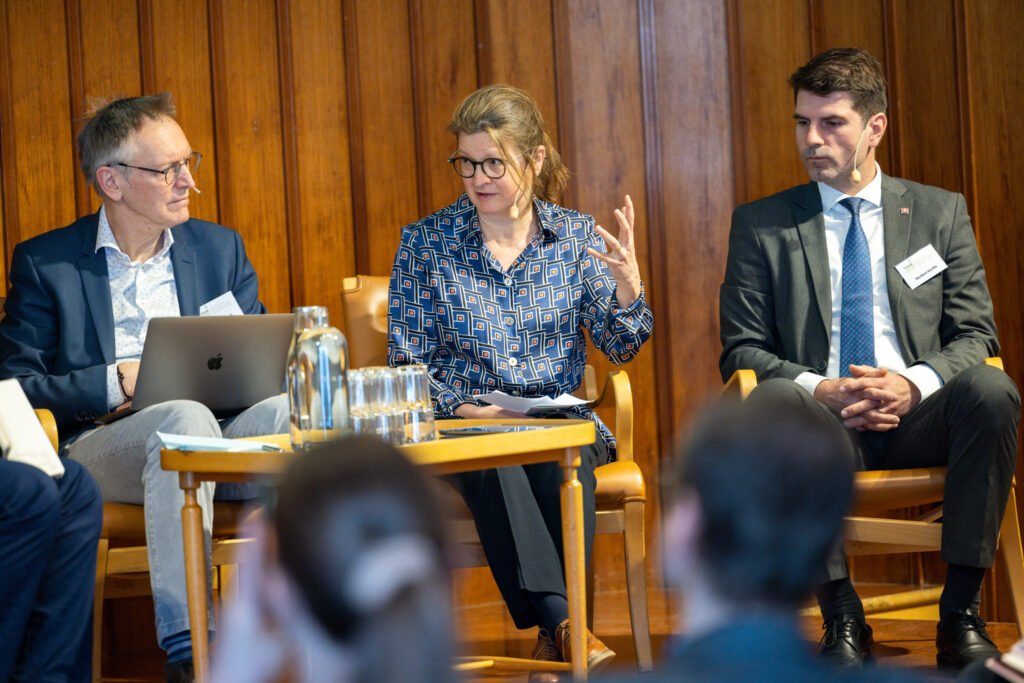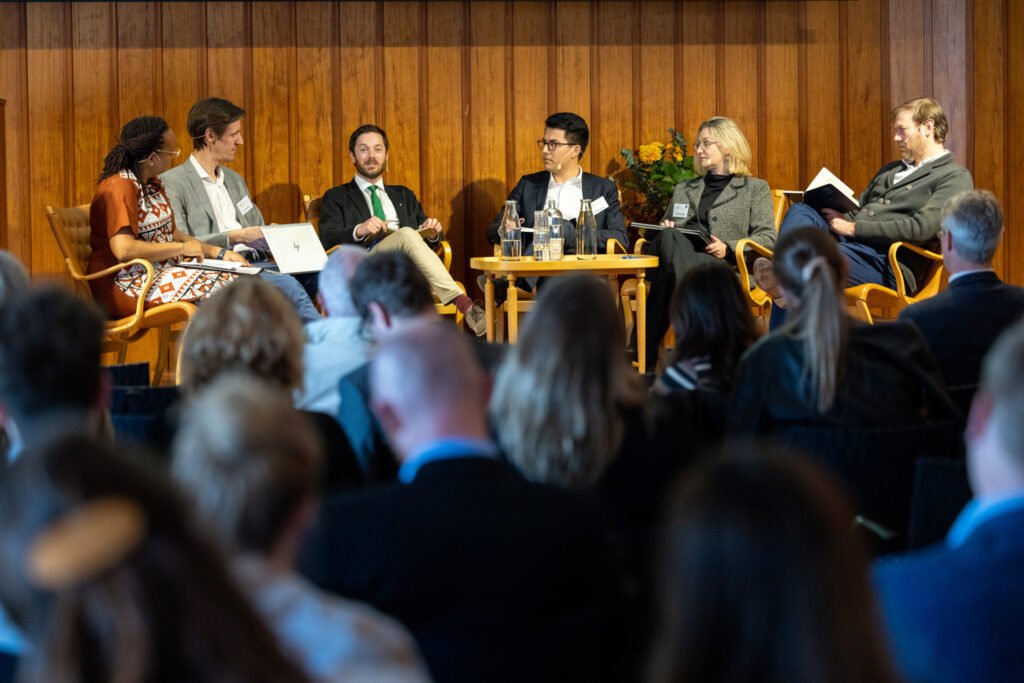On 20 April in Stockholm, SEI hosted the Think2030 Dialogue, converging policy makers, business leaders and researchers from across Europe. This high-profile event co-organised by IEEP focused on key sustainability issues critical for EU policy.
Launched by IEEP and its partners in 2018, Think2030 is an evidence-based, non-partisan platform of leading policy experts from European think tanks, civil society, the private sector and local authorities.
The European Green Deal at the centre of the European project

The event’s main theme was the EU’s role in ensuring future sustainability and resilience, both within Europe and abroad. A packed plenary, coupled with a live stream audience, welcomed a panel featuring the Executive Directors of the hosting partners: SEI, IEEP, Mistra, Formas and SIEPS.
Måns Nilsson, Executive Director of SEI, led the discussions and stated:
“We think that it is amazing that the European Green Deal is not only alive, but still very much at the center of the European project today.”
The panel stressed an urgent need for science-policy collaboration to navigate complex policy crises sustainably. They called for greater integration of scientific insights into policy making, emphasizing the crucial role of continuous pressure on integrating environmental issues into the EU’s external policies and adjusting its internal policies in response to global developments such as the US green subsidy program in its Inflation Reduction Act.
The Swedish EU Presidency’s key priorities

Daniel Westlén, State Secretary to the Swedish Minister for Climate and the Environment, reflected on the work of the Swedish Presidency of the Council of the European Union in the first half of 2023. He highlighted the turbulent times in which the presidency operates, marked by security crises, the war in Ukraine and the triple planetary crisis. He also discussed the informal meeting of the environment ministers hosted by Sweden the days before the event.
At the mid-point of the six-month Swedish Presidency, Westlén was positive about the progress made, stating that Sweden is on track to deliver on its four overarching priorities: security, the green transition, competitiveness and the rule of law. He also noted the interconnections between these issues.
“The aim of our presidency is to make the EU greener and safer and freer, these matters are not isolated but deeply intertwined, if we accelerate the green transition, we do not only reach our climate and environmental targets but we will also increase our security, our competitiveness and our European autonomy” Daniel Westlén said.
Daniel also stressed the importance of collaboration between member states, European institutions and the private sector to reach transition targets. Politics can support through decision-making in Brussels or Stockholm, but change needs to happen through individual decisions in households and in companies.
Maintaining the EU as a leader of green transition

Closing the livestreamed segment, the distinguished policy panel stressed the importance of the EU remaining a frontrunner in the green transition.
Janez Potočnik, Co-chair for UN International Resource Panel and former EU Commissioner for Environment, remarked “The European Green Deal was a miracle and was a real vision.” Claudia Hahn, Team Leader Environmental Strategy – DG Environment, agreed that the Commission was very ambitious in 2019 when it launched the European Green Deal. The panel emphasized the need to now concentrate our efforts on implementation.
“It is clear the more targets we set our self, the more the implementation gaps are increasing” says Claudia Hahn.
Norbert Kurilla, Senior Green Transition Advisor to the President of Slovakia, stressed that for the next phase and post 2024 European Green Deal, we need to focus on the social transition and social cohesion to make sure that nobody is left behind and to get solid backing from citizens, companies and stakeholders.
Janez Potočnik advocated for new business models that go beyond ownership. He pointed out that we need to deal with the system transformation required for an economy with resource effectiveness as a central focus.
Watch the recording of the opening remarks and policy panel below:
The European Green Deal and beyond

Four science and policy sessions delved deeper into specific sustainability topics, set against the backdrop of security and geopolitics, innovation and competitiveness, and social inclusion in the green transition. These sessions identified emerging priorities not only for the Swedish Presidency but also for the next Trio Presidency, beginning with Spain.
To read highlights from the science and policy sessions, see the following threads on Twitter:
Policy session 1: Energy transition and the cost of living
Policy session 2: climate security and trade
Policy session 3: Innovation and industry transition
Policy session 4: European Green Deal
The closing panels summed up the priorities for future post-2024 iterations of the European Green Deal, as set by the Presidencies of the Council of the European Union. These insights were provided by representatives from Think Sustainable Europe, a leading network of European sustainability-focused think tanks.
Antoine Oger, head of the programme for Global Challenges and SDGs at IEEP, made a compelling case for placing the SDGs at the heart of global action. He emphasized the importance of trade rules that foster sustainable, climate-neutral and secure food systems within the climate-policy nexus. Collective conversations, according to Oger, are instrumental in achieving these goals.
A consensus among speakers revealed that the European Green Deal has already made a significant impact in response to successive crises. The main questions for the future are: will there be a new EU Green Deal or new legislative files beyond 2024? And, crucially, can EU member states implement existing policies?
Felipe Sanchez highlighted the need for leadership and coordination within the EU and its member states to drive green industrial policy and innovation. To achieve a transformation, financial incentives and policy interventions must be designed to promote new business models that meet needs with fossil-free and resource-effective industrial production.
With Spain set to be the holder of the next Presidency of the Council of the EU, Mikel Gonzalez emphasized the importance of engaging citizens, vulnerable households and stakeholders to support the European Green Deal. He pointed out the proposed Critical Raw Materials Act as being vital for the EU’s strategic autonomy. The National Energy and Climate Plans that will be submitted during the Spanish Presidency will provide an opportunity to further increase ambition. Gonzalez identified Spain’s strong ties with countries in the Global South as an asset for enhancing cooperation on climate action.
Eero Yrjö-Koskinen, Executive Director at IEEP, concluded the event by suggesting the 2024 European Parliamentary elections could become a platform to highlight the everyday impacts of climate policy on people. While this approach may carry risk, it also offers substantial opportunities. For success, social equity must be a key consideration. The challenge lies in effectively communicating with citizens about the necessary transformations needed for a new economic model.
The Think2030 Dialogue Sweden provided a multi-stakeholder platform for science-based ideas and solutions, paving the way for the implementation of the European Green Deal and beyond. With the next Think2030 conference set to coincide with the Spanish Presidency of the Council of the EU in the second half of 2023, it will be interesting to watch how these discussions progress and what new strategies emerge.

